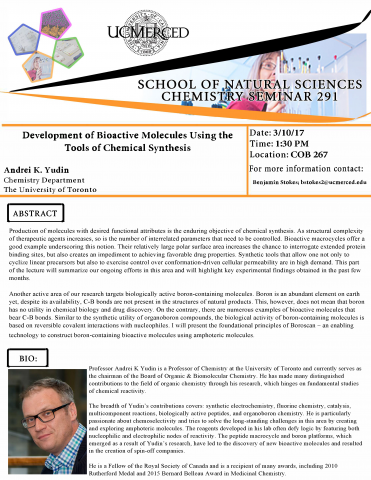Andrei Yudin, University of Toronto
Abstract:
Production of molecules with desired functional attributes is the enduring objective of chemical synthesis. As structural complexity of therapeutic agents increases, so is the number of interrelated parameters that need to be controlled. Bioactive macrocycles offer a good example underscoring this notion. Their relatively large polar surface area increases the chance to interrogate extended protein binding sites, but also creates an impediment to achieving favorable drug properties. Synthetic tools that allow one not only to cyclize linear precursors but also to exercise control over conformation-driven cellular permeability are in high demand. This part of the lecture will summarize our ongoing efforts in this area and will highlight key experimental findings obtained in the past few months.
Another active area of our research targets biologically active boron-containing molecules. Boron is an abundant element on earth yet, despite its availability, C-B bonds are not present in the
structures of natural products. This, however, does not mean that boron has no utility in chemical biology and drug discovery. On the contrary, there are numerous examples of bioactive molecules
that bear C-B bonds. Similar to the synthetic utility of organoboron compounds, the biological activity of boron-containing molecules is based on reversible covalent interactions with nucleophiles. I
will present the foundational principles of Boroscan – an enabling technology to construct boron-containing bioactive molecules using amphoteric molecules.




